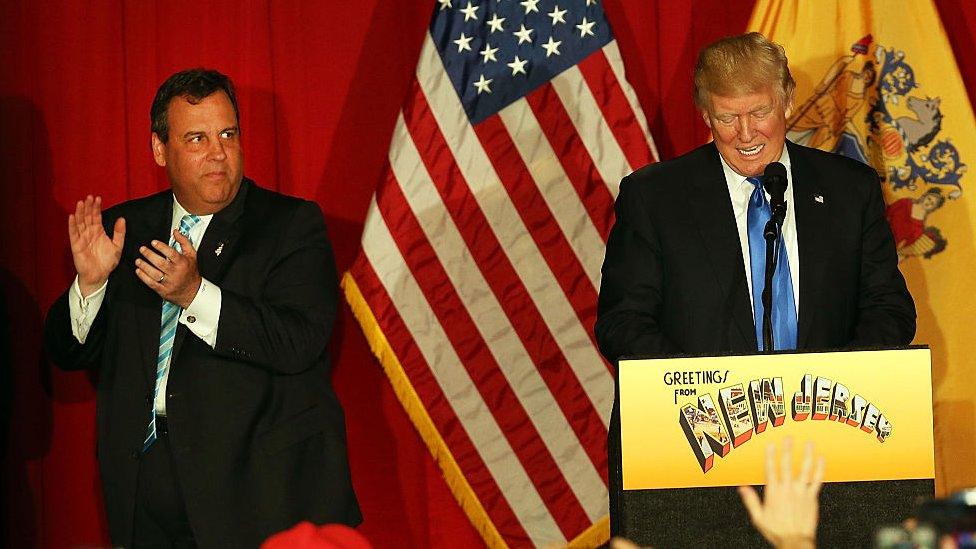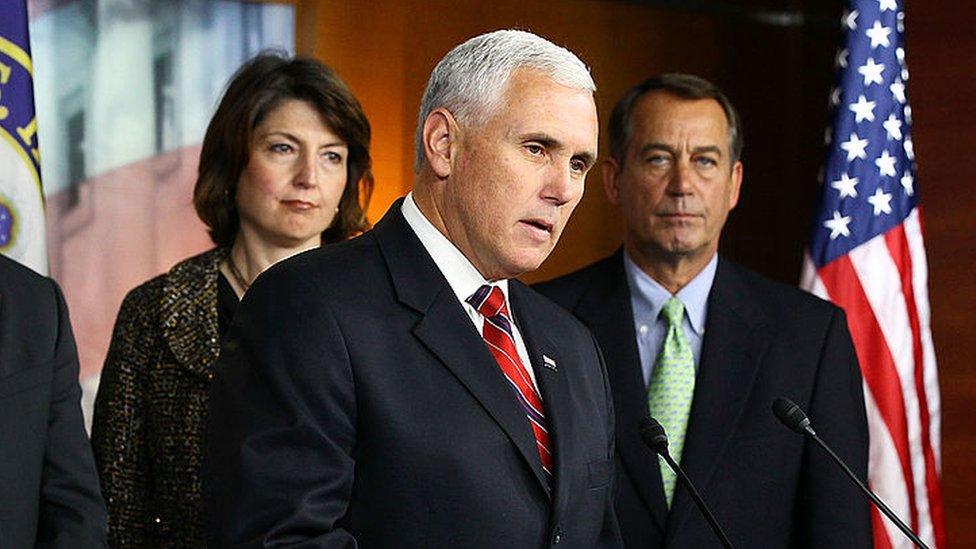Mike Pence as VP pick: Donald Trump opts for safe choice
- Published
Why did Trump pick Pence for VP?
So in the end Donald Trump went with the "safe" pick.
Former House Speaker Newt Gingrich and Chris Christie had too much political baggage.
General Michael Flynn was too untested in the political arena.
Other possibilities (Senators Joni Ernst and Bob Corker and (reportedly, external) former Secretary of State Condoleezza Rice) said no.
Mike Pence said yes. In a year that has defied political conventions, he was a very conventional choice.
The Indiana governor has executive experience and a strong legislative resume from his 12 years as a member of the US House of Representatives.
While in Washington, he chaired the Republican Study Group, a coalition of hard-core conservatives, which gives him solid bona fides among the grass-roots Tea Party wing of the party that has occasional doubts about Mr Trump's ideological purity.
He is, in House Speaker Paul Ryan's words, a "movement conservative" - a true believer who voted against key legislative items backed by then-President George W Bush, such as a federal prescription drug benefit for the elderly because he viewed them as a dangerous and wasteful big-government expansion.
He satisfies Mr Trump's stated desire to have a veteran political hand as his second-in-command, someone who can help shepherd his agenda through what could be a suspicious Republican-controlled House and a sharply divided, if not Democrat-majority, Senate.

Donald Trump opted for Mike Pence over more outspoken candidates, like New Jersey Governor Chris Christie
Part of the running-mate selection process is finding a number two who can broaden the nominee's appeal, and Mr Pence ticks some of these boxes as well. At 57, he's a bit younger than the 70-year-old Mr Trump. He also hails from the Midwest, which Mr Trump's team has identified as perhaps the key battleground in his quest for the White House.
In Republican circles Mr Pence's record isn't entirely clean, however. Some on the right have criticised the governor for backing down when the state's "religious liberty" law was challenged by LGBT activists and local businesses last year.
Mr Pence's decision to expand Medicaid government health-care coverage for Indiana's poor is also considered a strike against him. Those apparent apostasies could be general-election boons, however - particularly to the working-class whites who Mr Trump is targeting.
Perhaps the biggest real question surrounding Mr Pence is whether he will have the rhetorical dexterity to fulfil the traditional running-mate roles of political attack dog on the stump and the nominee's most ardent defender.
He is not considered a particularly gifted speaker - opting for middle-America plain-spokenness in contrast to the East Coast tough-guy approach of someone like Chris Christie. Mr Pence will need to be able to skilfully explain away Mr Trump's more controversial statements with some measure of believability.
It's an open question whether he is up to the task. Mr Pence has been a Trump critic in the past, saying his proposed Muslim immigration ban was "offensive and unconstitutional".
Mr Pence had been testing his voice over the past few days, calling Mr Trump "a fighter, a builder and a patriot" in a fiery (for him) speech. Now he'll be doing battle alongside him for the next four months - and possibly longer.

Before he was a governor, Mike Pence made a name for himself in Congress as a hard-nosed conservative
This begs the question of why Mr Pence, unlike many of his establishment politicians, has chosen to embrace the iconoclast New York real estate mogul. By accepting a place on the ticket, he is dropping his bid for re-election as Indiana governor. A loss in November means Mr Pence is out of a job.
There's no doubt that the Indianan has presidential ambitions. He actively flirted with a 2016 run, putting in appearances at many of the candidate cattle-calls that dotted the political calendar last year. He also visited key primary states in 2008 but eventually set his sits on the Indiana statehouse.
If Mr Pence wins the vice-presidency in November, the political benefits will be obvious. But even if he loses - assuming the defeat is not an annihilation- he could position himself nicely for a 2020 presidential run.
The field that year will likely be crowded with candidates, like Texas Senator Ted Cruz and Wisconsin Governor Scott Walker, who have some national campaign experience under their belt and will be angling to appeal to the disaffected voters Mr Trump rode to the Republican nomination.
Serving as Mr Trump's running mate now could set Mr Pence apart from that crowd as the man with the establishment pedigree who fought alongside the right-wing populist hero.
Or it could all fall apart for Mr Pence, as he disappears beneath the waves aboard the USS Trump.
Politics is full of calculated risks and educated gambles. Mr Pence just pushed all his chips onto the table.
- Published22 July 2016
- Published13 May 2016
- Published6 July 2016